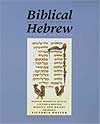 I have updated my database based on the Hebrew vocabulary of Bonnie Pedrotti Kittel, Victoria Hoffer, and Rebecca Abts Wright, Biblical Hebrew: Text and Workbook, Second Edition (New Haven: Yale University Press, 2005; Buy from Amazon.ca | Buy from Amazon.com).
I have updated my database based on the Hebrew vocabulary of Bonnie Pedrotti Kittel, Victoria Hoffer, and Rebecca Abts Wright, Biblical Hebrew: Text and Workbook, Second Edition (New Haven: Yale University Press, 2005; Buy from Amazon.ca | Buy from Amazon.com).
While the actual vocabulary has not changed much with the second edition, there are significant changes in how the vocabulary is presented and arranged. The entries for each word are expanded to include various examples of inflected forms (e.g., nouns in construct or with suffixes; verbs in various stems and forms, etc.). In order to facilitate memorization, the words (when appropriate) are now grouped according to their (supposed) etymological root. Thus, for example, עָלָה “go up,” עֹלָה “burnt offering,” עַל “on, upon,” and מַעַל “above” are grouped together. While this is a good move, it also creates a numbering nightmare since cognate terms are all given the same number (in the above example, the words receive the numbers 8, 8a, 8b, and 8c). While it is an improvement on the first edition, the new vocabulary has a number of errors and questionable inclusions, as well as some cases where the supposed roots are debatable.
The database includes all of the vocabulary from the second edition of Kittel, as well as a selection of frequent proper names and places. There are two databases available. The only difference between them is how the words are grouped.
- Vocabulary Organized by Lessons. This database has the words grouped according to when they are assigned in the lessons in Kittel. The disadvantage of this arrangement is that students will be responsible for anywhere from twenty-four to five words depending on the lesson. It also extends the memorizing of vocabulary throughout the entire textbook. (Lesson 53 is the extra section with proper names and places.)
- Vocabulary Organized by 20s. Rather than grouping words according to the lessons from Kittel, this database uses the chapter tags to organize the words into groups of twenty words. This allows students to build vocabulary at a constant rate throughout the year and also (depending on how you assign the vocabulary) allows you to finish it earlier in the year allowing more time for review.
The database works with Teknia Flashworks, a cross-platform vocabulary drilling program in which each word in the chosen database is tagged for type (noun, verb, etc.), chapter, and frequency in the biblical text. You may sort the words, for example, by chapter or randomly mix them for review. The software was developed by Teknia Software and William D. Mounce, the author of Basics of Biblical Greek and many other Biblical Greek resources.
The database is available in Windows, Mac OS X and Classic (OS 8.2 through 9.2). For more information and to download the database and program, see my “Resources for Kittel’s Biblical Hebrew: Text and Workbook” Page. (For those interested, I have also updated my “Introductory Hebrew Grammars” page)
